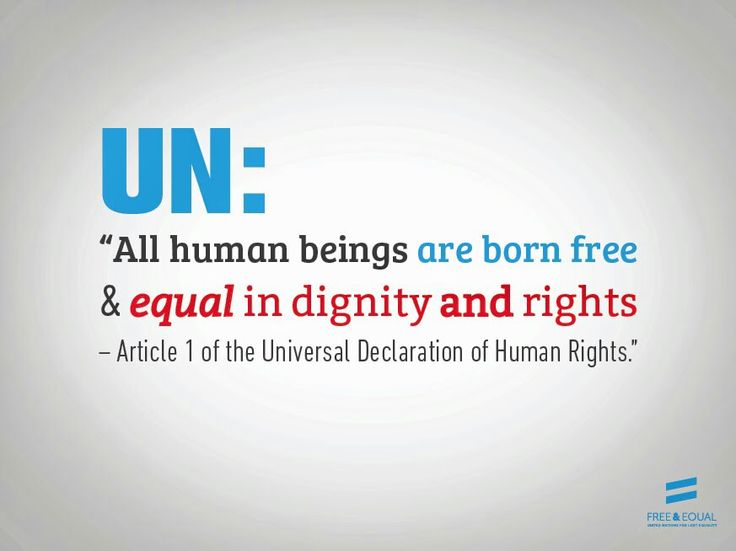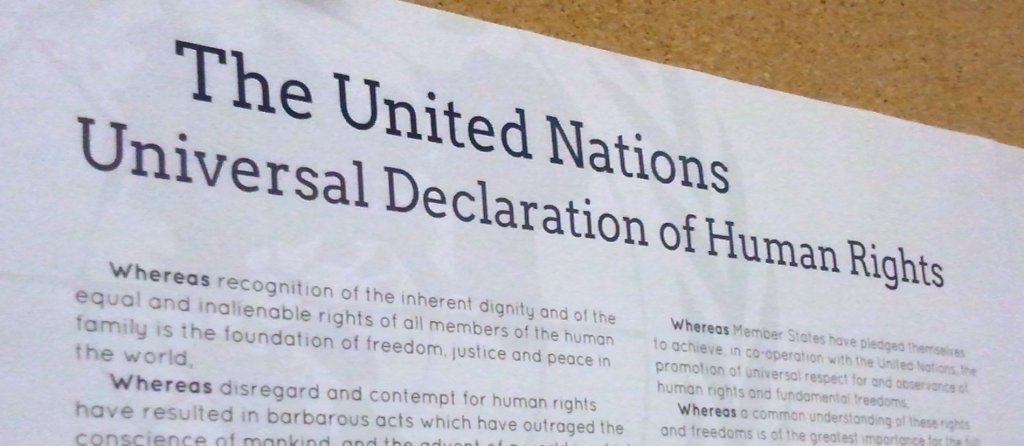Sometime in 2006, I was asked to make an oral statement on behalf of a Canadian NGO during the general discussion at the UN. I was oriented to the procedure of making oral statement, and told that it must not exceed three minutes, that too allowed only for a limited number of NGOs who managed to acquire consultative status with ECOSOC. I said: “But I have so many things to say and demand all the rights we are denied as an LGBTIQ human being and I am not even a fast speaker, 3 minutes won’t be sufficient!” Other colleagues, who were not first timers, laughed at me and told me,“If anyone continues speaking for more than 3 minutes, the in-charge of the discussion will cut off his/her microphone.” I told my activist-colleagues in jest: “For the first time in my life my right to speech is limited, that too, inside the UN building.” I made my deliberation, but hardly anyone was listening, and the other activists did the same too, raising different important human rights issues. I asked a colleague from Canada whose NGO had the ECOSOC status and had allowed me to speak at the UN: “So all the human rights, including LGBTIQ rights, which we raised during the discussion, will be secured now on?” He laughed and told me:
“We do it for the sake of record only. Even many governments’ deliberations won’t make much difference here, only powerful countries can decide on development, security issues and what human rights we are supposed to have.”
I was very disappointed to have travelled all the way to Geneva to exercise my ‘limited rights to speech’ inside the UN, and that too with no impact. At that moment I decided to focus on domestic interventions, UN was not worth spending energy.
Then I saw the UDHR — Universal Declaration of Human Rights (UDHR), which was proclaimed by the United Nations General Assembly in Paris on 10 December 1948 (General Assembly resolution 217 A), that is believed to be a milestone document in the history of human rights. I got even more confused once I read the UDHR, Article 1, first sentence. Which is: All human beings are born free and equal in dignity and rights.

When I read this sentence for the first time I thought ‘WOOOOOW’. But when I read and re-read it carefully and contemplated on it, I found out how misleading this statement was/is. Even though the notion that all human beings are born free and equal in dignity and rights is just a statement of a mission, a goal to be achieved, a target; what’s happening after so many years of UDHR? Is it really ever achievable? Even just looking at the material world, the world will remain, in one way or other, hierarchical. It was and still is- gender, caste, color, economy based hierarchical, and now we have technology, corporate based hierarchies. The grounds for hierarchical world will change but some kinds of hierarchy will always remain. The questions is how to change hierarchy into diversity, which is a beautiful world where privileged ones wish to share and not so privileged ones do not feel envy. There are three dimensions of life: material, intellectual and emotional, some are good at one, some at others.
If we are born free and equal in dignity and rights, why do so many people become ‘refugees’ every day, have to move out from their own home and homeland due to war, persecution and violence? Why the ‘refugees’ have no rights and freedom in the new country after they are forced to leave their own home land? Why Lesbian and Gay people are not equal? Where are the dignity of women in many countries and cultures, where are the dignity of migrants workers? Where are the rights of indigenous and tribal people? Where are the rights of third-gender people who even can’t identify the way they feel who they are? All the UDHR’s slogans of freedom, equality, dignity and rights do not hold in the fields of the world. People are dying due to war, hunger, preventable diseases; yet the most powerful department at the UN, the Security Council, whose primary responsibility under the United Nations Charter is to maintain international peace and security, has as its permanent-member countries who are the highest developers, possessors and exporters of all kinds of lethal arms to the world- USA, Russia, China, France and UK and are the least qualified for international peace and security. Have you ever heard of a bigger MYTH than this?
Freedom, Equality, Dignity and Rights in Eastern Cultures
Now let’s look at how the concept of freedom and equality, dignity and rights are perceived in ‘Eastern’ beliefs and cultures.
Buddhism, Jainism and Hinduism believe that not only humans but all the sentient beings are entrapped by their past ‘karma and consequences’, from the time without beginning, primarily due their ignorance (avidya in Sanskrit, not knowing THE truth). So, for eastern cultures, the very birth of human, despite being considered a better realm compared to animals and demons or even demi-gods, is understood to be chained by the cycle of Samsara (the endless cycle of life and birth and misery that comes along with it). All these eastern doctrines, absolutely, do not believe that humans are born free; rather the whole focus is on exploring ‘how to become free from the cycle of Samsara’. With better Karma, your life, now and in the future, is believed to become better both materially, intellectually and emotionally; with mediation and insights you are believed to be able to realize the wisdom to be ‘truly and totally free’. Buddhists call it Nibbana (in Pali)or Nirbana (in Sanskrit), Jains call it Kaibalya and the Hindus call is Mokshya.
And we see every day in today’s world, people are not born free, many suffer miserable conditions like hunger, disease, violence, war like conditions, not having proper shelter, health care or security. These are the material sides of freedom aspect. Many people are intellectually ignorant and have wrong views about either themselves or others. Some may believe that being women or LGBTIQ is inferior to men; some may think that people practicing another religion are fanatics; some may believe that speaking English makes you successful; some may think that fairer skin of color is beautiful, so on and so forth. Thus many are not intellectually free either. Then the emotional aspect of freedom is even important. Let’s think about how many of us in the world are free from hatred, jealousy, cravings, animosity, and sense of revenge, and how many of us have managed to cultivate the true compassion, friendship and forgiveness. So there is a bigger problem of emotional caging in the world today.
We are largely neither materially, nor intellectually, nor emotionally free. So calling humans are born free is a myth.
Let’s look at the equality aspect now. Equality is defined as the state of being equal, especially in status, rights, or opportunities. This sounds noble, yet this concept of equality is not that simple and very Utopian to achieve. The word ‘status’ belongs to the emotional world; the word ‘rights’ belongs to the intellectual world and the word ‘opportunities’ belongs to the material world. Every sentient being, including humans, are born with different and unique physical characteristics, intellectual makeup and emotional strength (Bhinnata, भिन्नता, in Sanskrit), no one can force to change these aspects and trying to change it can lead to a dangerous game. It should be about respecting these emotional, intellectual and material qualities of each and every one, not trying to equalize (or standardize) them. Some scholars argue saying: “Oh, equality is all about equal opportunity.” Try to argue for the US president taking oath by putting his left hand on a Quran, not on a Bible; try to push for an idea of Thai King belonging to any religion, not just being a Buddhist; try to ask a mosque in northern Pakistan not to play loud speaker during their early morning prayer because children’s sleep may get disturbed. Is China not accepting or allowing multi-party democracy considered as having equality among the Chinese people or a lack of it? Is North Korea’s persuasion of nuclear weapon acquisition considered equality or lack of it, as some countries have it in abundance then why not others? In some states in India and also in Nepal, killing or even selling cow’s meat is a criminal offense, is respecting religious sentiments of Hindus considered equality or some poor people’s right to sell cow meat?
‘Equal opportunity’ too is an overly simplified argument to establish Utopian idea of everyone being equal. Let’s look at the classical example to understand equality: equal opportunity to education, every child must have access to education. How this access to education unfolds in reality? Physically: how far, in which location should justify the equal access and the kinds of facilities; are transgender allowed to sit in the same classroom or do you open different schools for them? What about a shepherd family who lives in the middle of mountains all by themselves; do their children will have easy access to school nearby? And so on. Intellectually: what type of curricula; through which language-medium? Some governments have made it compulsory for all the kids to go to school, so some parents, who wish their child not to go to the school and would rather teach them at home a different curricula, may be prosecuted. A child wishing to study shamanism, for example, is not-only not supported by the government, but may be denied it all together, because only the ‘modern education’ system and curricula is acceptable these days. So who decides what subjects are included into this “access to education” concept? Emotionally: Some students are extroverts and thus need constant attention while others are introverts and prefer to be left alone. Some girls don’t like to wear women’s clothes and some boys love wearing women clothes. Are the education systems capable of looking after different emotional needs of diverse children; how do they explain to a darker skin child when his /her text book says fair-skin-color is beautiful (such picture of a text book from India was circulated in Facebook recently). When a text book says being LGBTIQ is a disorder, how is the emotional downfalls of LGBTIQ students handled? How do the standardized systems of tests/exams and certifications determine who may be not as well intellectually but emotionally a brilliant personality and which trait is better? There are other emotional attributes that are attached to one’s specific family, culture, tradition or religions like finding vegetarian meal in a school canteen for a child who may be vegetarian in mid-France; and in Argentina, where the idea of being vegetarian itself can be strange.
Equality (in disguise) is a process of standardization which kills the diversity and often fails to recognize the intellectual and emotional side of humanity; this is how so many cultures, languages and traditions have already perished. Discrimination on any grounds must not be allowed but what we need is respecting our unique physical, intellectual and emotional traits which each and every one of us possesses, and is allowed and supported to excel and realize the highest human potentials (for the larger good) without attempting the process of standardization and compartmentalization.
Dignity and Rights are excellent, yet, traditionally a ‘western’ concept which encourages people to demand these for themselves. According to the eastern philosophies, more emphasis are given up on your duty towards others rather than thinking what you can have for yourself, similarly more emphasis is given upon supporting others for their success and cherishing other’s success (called metta in Pali) rather than thinking about your own ‘worthy of honour or respect’. There are forced translations for the word right (as a human right) into the South Asian languages; otherwise the concept of right is somehow alien to South Asians, whereas concept of karma (good karma means duty for others’ benefits) is so much ingrained into the cultures and social value system.
So, whether looking from the western perspective, the United Nations UDHR’s article 1’s first sentence: All human beings are born free and equal in dignity and rights, is far from the ground reality and hugely misleading; Or looking from the eastern perspective, the ‘Article 1’ is a sheer myth.
In today’s world where there is so much hunger, poverty, disease and violence, following just the ‘eastern’ concepts of Nibbana, Bhinnata, Metta and Karma would not be possible without having a bit of ‘western’ experiences of freedom, equality, dignity and rights. To be able to mediate or do good karma, one must be free from war, violence, abuse, hunger, diseases and must have basic needs fulfilled like shelter, clothing, basic education, health care etc. At the same time, no matter how much economic progress the world will make, without cultivating compassion, mindfulness and meditating to purify your mind from hatred, jealousy, cravings, animosity, and the sense of revenge; the humanity will continue to be dominated by war, violence, abuse, hunger, lack of health care and grater disparity. To free the world; we must have free souls; to free the souls, we must be in the free world. By connecting outer world with the inner soul, one may enter from the cycle of Samsara to the cycle of Nibbana.
Freedom to the World and Freedom of the Soul, both goes hands in hands!!!
- JK Rowling and Trans Debate is Driven by Western Perspectives - August 10, 2020
- Development crisis: Humans are the problem, Human must be the solution - September 13, 2017
- Marry a Feminine-Nature and a Masculine-Energy Before You Can Marry a Man - August 30, 2017

